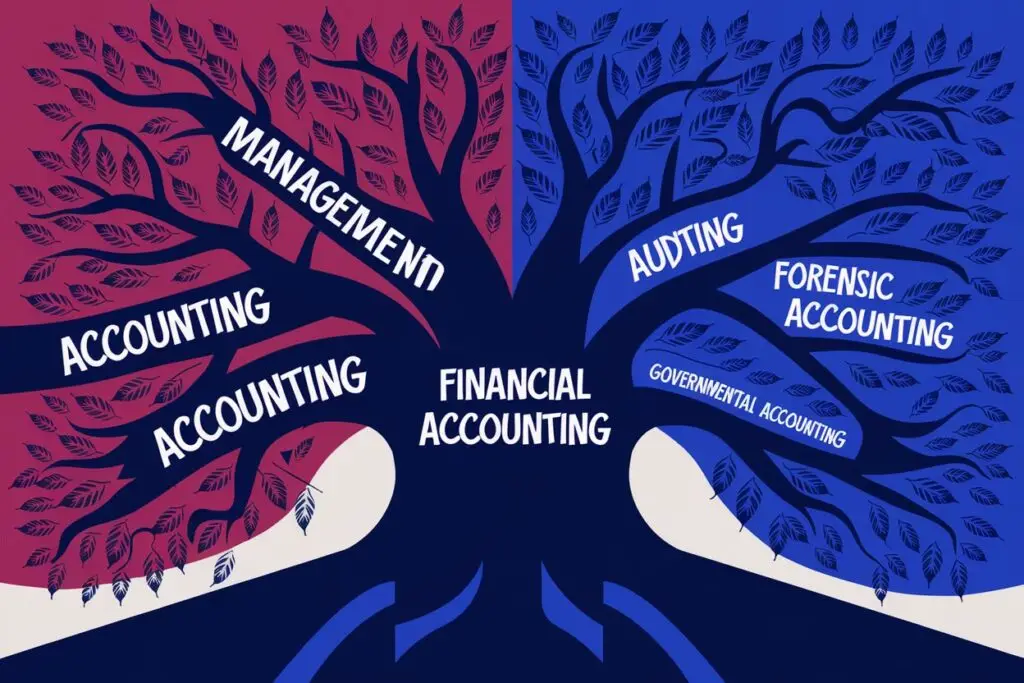The Branches of Accounting
Accounting is often referred to as the language of business. It involves the systematic recording, measuring, and communication of financial information about economic entities. Just like any language, accounting has its dialects, or branches, each serving unique purposes and functions. Whether you’re a small business owner, a finance student, or simply curious about the field, understanding the branches of accounting is invaluable.
A Quote to Reflect On
“Accounting is the language of business.” – Warren Buffett
The Main Branches of Accounting

While there are many nuances in the field of accounting, it can broadly be divided into several key branches. Below is an overview of the main branches, along with a brief description of each.
| Branch | Description |
|---|---|
| Financial Accounting | Focuses on the preparation of financial statements that provide a summary of the financial performance of an entity. |
| Managerial Accounting | Involves the use of accounting information for internal decision-making. It aids managers in budgeting, forecasting, and performance evaluation. |
| Cost Accounting | A subset of managerial accounting, cost accounting emphasizes the tracking, recording, and analyzing of costs associated with production processes. |
| Tax Accounting | Deals with the preparation of tax returns and planning of tax strategies. It ensures compliance with tax laws and regulations. |
| Auditing | Involves the examination and verification of financial records to ensure accuracy and compliance with applicable standards. |
| Forensic Accounting | Combines accounting, auditing, and investigative skills to assist in legal matters, often involving fraud investigations. |
| Governmental Accounting | Focuses on the recording and reporting of financial transactions for government entities and ensuring that public funds are used effectively. |
| Nonprofit Accounting | Tailored towards non-profit organizations, it accounts for donations, grants, and expenditures with a specific focus on accountability. |
Detailed Look at the Key Branches
Financial Accounting
Financial accounting provides a clear view of the financial position of a business at the end of a specific period. It includes the preparation of key financial statements, such as:
- Balance Sheet: Shows what a company owns and owes at a specific point in time.
- Income Statement: Provides a summary of revenue and expenses over a particular period.
- Cash Flow Statement: Illustrates how cash enters and leaves the organization.
Managerial Accounting
Managerial accounting, or management accounting, is designed for internal stakeholders. It involves creating detailed reports that help management make informed business decisions. Common tools include:
- Budgets
- Performance reports
- Variance analysis
Cost Accounting
The purpose of cost accounting is to analyze the expenditure so as to ascertain the cost of each product, operation, service, etc. The price of an article is nothing but the cost plus a certain amount of profit. Unless the cost is known, the price cannot be fixed rationally. Cost accounting helps not only in ascertaining the costs but also assists the management in controlling the costs.
Cost accounting focuses on capturing all costs associated with production to identify areas where efficiency can be improved. Key methodologies include:
- Standard costing
- Activity-based costing (ABC)
- Job order costing
Tax Accounting
Tax accounting revolves around ensuring full compliance with tax regulations while minimizing tax liabilities. Key responsibilities include:
- Preparing tax returns
- Conducting tax planning
- Understanding tax implications of financial decisions
Auditing
Auditing is critical for ensuring the integrity of financial information. Auditors assess the accuracy of financial statements and adherence to standard operating procedures, covering both internal and external audits.
Forensic Accounting
Forensic accountants investigate financial discrepancies and fraud cases. They often work closely with law enforcement and provide essential evidence in court cases concerning financial issues.
Governmental Accounting
Governmental accounting ensures that government agencies account for their funds accurately and transparently. This involves compliance with specific accounting standards set by governments.
Nonprofit Accounting
Nonprofit accounting focuses on fundraising, donations, and grants. It emphasizes accountability to donors and stakeholders by providing detailed reports on how funds are used.
Frequently Asked Questions (FAQs)
1. What qualifications do you need to work in accounting?
Most accounting positions require at least a bachelor’s degree in accounting or finance. Professional certifications, like CPA (Certified Public Accountant) or CMA (Certified Management Accountant), can enhance job prospects.
2. What is the difference between financial and managerial accounting?
Financial accounting focuses on external reporting to stakeholders such as investors and creditors, while managerial accounting is mainly for internal management purposes, aiding in decision-making.
3. Why is forensic accounting important?
Forensic accounting is crucial for uncovering financial fraud, providing evidence in legal cases, and enhancing the overall accountability and transparency of financial practices.
4. How can I choose which area of accounting to specialize in?
Consider your interests and career aspirations. You may find it helpful to explore internships or entry-level positions in different branches to gain a better understanding of where you might want to focus.
5. What role does technology play in accounting today?
Technology streamlines accounting processes, increases accuracy, and enables real-time financial monitoring. Software tools and applications help accountants manage data more effectively.
Conclusion
Understanding the branches of accounting provides a richer perspective on how financial information shapes business decisions and influences the economy. Whether for personal knowledge or professional aspirations, grasping these fundamentals can open many doors. As the landscape of accounting continues to evolve, staying informed will only enhance your ability to navigate this essential field.



